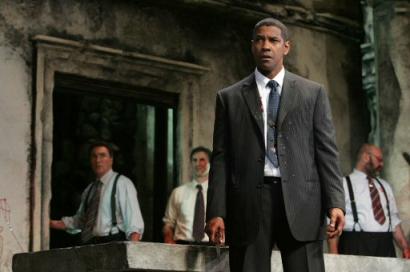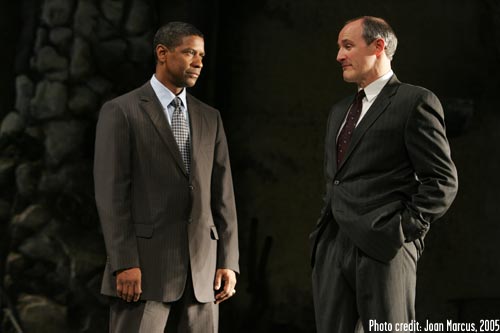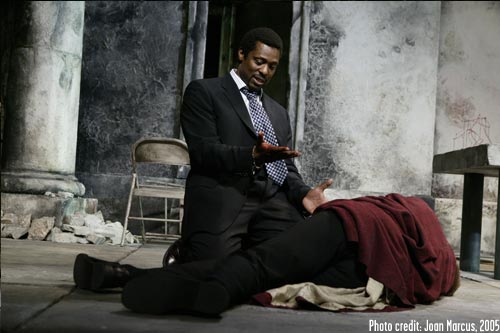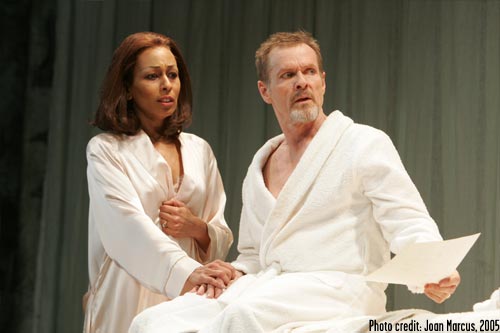“As quintessentially American as Ms. Part is Russian, Gillian Murphy joined ABT in 1996, instantly raising our national banner of strong, brisk, technical prowess.” By the way, my sister’s fall ABT season began on Wednesday, so if you’re in the New York area and looking to partake of some choice offerings of world-class ballet, head on down to City Center. The Fall Repertoire includes Afternoon of a Faun, Apollo, Dark Elegies, Gong, The Green Room, In the Upper Room, Kaleidoscope, Rodeo, and Les Sylphides.
Tag: NYC
We’ll always have New York.
 Beauty and the Beast share a private moment in this magnificent teaser image for PJ’s King Kong.
Beauty and the Beast share a private moment in this magnificent teaser image for PJ’s King Kong.
Mode of Infamy.
As also noted at DYFL, Depeche Mode announce their Fall 2005 tour dates, and they look to be playing the Garden on December 7. (I may also venture out to the Borgata on 12/3…we’ll see.) Whatsmore, the full video for “Precious” is now online, and, just as the single has a great throwback feel to it, the video includes several thematic elements — ship, gears, Dave walking around — from the Some Great Reward era, and particularly the old, outrageously dated video for “People are People.” Hopefully, the rest of the album also measures up as a return to form. (Better video links via Quiddity.)
Once there weren’t greenfields.
“Black inhabitants of the ‘neat little settlement,’ the [1856] article said, ‘present a pleasing contrast in their habits and the appearance of their dwellings to the Celtic occupants, in common with hogs and goats, of the shanties in the lower part of the Park…The policemen find it difficult to persuade them out of the idea which has possessed their simple minds, that the sole object of the authorities in making the Park is to procure their expulsion from the homes which they occupy. It is to be hoped that their removal will be effected with as much gentleness as possible.'” A team of archaeologists from Barnard and City College use ground-penetrating radar to probe under Central Park for remains of Seneca Village, a 19th century settlement displaced to make way for Olmstead & Vaux’s grand refuge and left forgotten for over a century.
Brown to Blue.
It’s official…Larry’s coaching New York next year, and Knickerbocker fans are already dreaming big. Well, he’ll have his hands full with our current gaggle of undersized forwards and shoot-first guards.
Search Engines.
Based in Chesapeake at the moment, I’ve been missing out on all the madness in NYC these days, such as bus evacuations and the new, already-infamous subway searches. Others such as Medley have already ripped this new policy to pieces, but, really, what are they thinking? Any actual, honest-to-goodness terrorist with a bomb on their person will refuse the search request, turn around, and make the 5-7 minute walk to another subway station. These searches are totally pointless and at best produce nothing more than a hassle for commuters and the fleeting illusion of security. At worst, they’re flirting with unconstitutionality and give the impression of police state search-and-seizure tactics becoming omnipresent in American life. Isn’t that what the “evildoers” want?
Sylvia on Pointe.
 “Gillian Murphy, who danced Sylvia on Friday, looked as if she were born to dance this role. Her natural, bold attack and imposing presence make her the perfect Sylvia.” Gill’s star turn in ABT’s revival of Sylvia (which I caught at the Met on Friday) opens to stellar reviews. In addition, Gill is profiled in this month’s Pointe Magazine. (Unfortunately, the text is unavailable online, although the pics are here.)
“Gillian Murphy, who danced Sylvia on Friday, looked as if she were born to dance this role. Her natural, bold attack and imposing presence make her the perfect Sylvia.” Gill’s star turn in ABT’s revival of Sylvia (which I caught at the Met on Friday) opens to stellar reviews. In addition, Gill is profiled in this month’s Pointe Magazine. (Unfortunately, the text is unavailable online, although the pics are here.)
Washington in Rome.
“Why should his name be sounded more than yours? Write them, yours is as fair; Sound them, Yours doth become the tongue as well.” Why? Well, cause he’s a full-fledged movie star, that’s why. Still, despite having a bit of a muttering problem at times, Denzel acquits himself “honorably” as Brutus in Julius Caesar, which I saw last night at the Belasco Theatre. Set in a half-post-apocalyptic, half-Depression-era Rome that evokes anything from Masked & Anonymous to Black Hawk Down, this version of Shakespeare’s classic is innovatively staged and well-worth seeing, but, unfortunately, it also suffers from a stylistic dissonance that hinders the play at its most crucial moments.
The central problem with this production is the clash of acting methods. Many of the actors — and particularly Denzel — underplay their roles to the extreme. In fact, in delivery if not in diction, Denzel’s naturalistic Brutus is only a step or two from most of his other performances, be it Glory, Devil in a Blue Dress, or The Manchurian Candidate. That would be fine, if everyone else was on the same page, and a lot of the other actors are. Jack Willis (at left) deadpans Casca like Cypher from The Matrix, and Patrick Page steals his one major scene (in which he convinces Caesar to report to the Senate on the Ides of March) by portraying Decius Brutus as the worst kind of unctuous DC aide, complete with a leather executive folder in tow and a flatterer’s simper plastered on his face.
Unfortunately, some of the other actors didn’t get the memo. Bill Sadler’s Caesar is prone to acts of grandstanding, but that’s acceptable — he’s Caesar, after all, and bestrides the narrow world like a Colossus. No, the main offender is Colm Feore as Cassius, who plays the lean, hungry Machiavel in full “Master Thespian” mode — at times he’s hammier here than he was in Riddick. I’ll admit, I may be being a bit hard on Feore, as Cassius has always been one of my favorite Shakespearean characters (well, until he gets all weepy and high-maintenance in the second half of the play.) And Feore’s performance might be fine for a different cast of Caesar…but here, he’s just off. If this is Denzel’s Julius Caesar, as everything seems to suggest, Feore’s portrayal of Cassius should have mirrored Denzel’s low-key, understated Brutus. Instead, Feore is overplaying to the hilt, and the contrast is jarring in every scene the two central plotters share.
The Denzel-disconnect causes problems elsewhere, too, notably in the crucial Act III funeral speeches. Eamonn Walker makes a fine Mark Antony throughout, but he just doesn’t have the star wattage or natural charisma of Denzel Washington. As a result, Antony’s manipulative eulogy — the critical hinge moment of the play — seems slightly tepid and uninvolving compared to Brutus’ earlier rousing oratory. It’s possible that I’m just ruined by the James Mason-Marlon Brando version, as there does seem to be some precedent in the play for this take: “I am no orator, as Brutus is…I have neither wit, nor words, nor worth, action, nor utterance, nor the power of speech, to stir men’s blood.” Still, I think there’s a dramatic problem if Brutus’ oration is more of a showstopper than Antony’s. If anything, it seems here that their roles should have been reversed.
Still, despite these grievances, Julius Caesar is a satisfying production for the most part, with some particularly nice visual flourishes throughout. The Escape from New York, Berlin-bunker look of the set seems strange at first, but gains potency as the play darkens — in the “Cinna the poet” mob scene, for example. (Speaking of which, between this and Sith, it’s been a bad week for republics.) And I particularly liked the look of the Senate, even if it was somewhat reminiscent of Liev Schrieber’s EXCOMM war room in the Henry V revival two years ago. (With that in mind, the play gets off a great Homeland Security gag, as the various conspirators have to figure out a way around the Senate metal detector.)
The war scenes of the final acts are also surprisingly kinetic, with Roman forces garbed in guerilla green or black weaving through the hollowed-out set and spouting commands in verse. In fact, while I guess this shouldn’t be a shock given the subject matter, this production of Julius Caesar is also quite grisly — they don’t skimp on the blood and gore, and Sadler’s corpse is frozen in a horrifying Ring-like rictus scream during the Antony speech. (Strangely, this produced nary a shudder in the crowd, while the mere sight of Caesar’s bare posterior earlier on sent the audience into a paroxysm of shocked gasps — the MPAA has screwed up this country something fierce.)
So, in sum, Julius Caesar is a worthy production that makes for a good evening out, but it’s got some issues that keep it from being an all-time classic version of the play. The fault, dear readers, is not in its stars, but in its supporting cast, that they are underlings. In the end, a more balanced production, with either more or less star power, would have probably worked out better.
Prize Jury.
 Neglected to mention this earlier…but last week, I caught Roundabout’s Twelve Angry Men revival at the American Airlines theatre. As with Streetcar, my basis for comparison is fuzzy — I saw the Henry Fonda film years and years ago. Nevertheless, I’d say this version does justice to the material, and is well worth seeing if you get the chance.
Neglected to mention this earlier…but last week, I caught Roundabout’s Twelve Angry Men revival at the American Airlines theatre. As with Streetcar, my basis for comparison is fuzzy — I saw the Henry Fonda film years and years ago. Nevertheless, I’d say this version does justice to the material, and is well worth seeing if you get the chance.
Unlike the star-studded HBO version, this 12 Angry Men works as a great showcase for underappreciated character actors. The most famous face is probably the ubiquitous James Rebhorn as Juror #4, although #7’s John Pankow (a.k.a. Paul Reiser’s brother on Mad About You) and Broadway veteran Tom Aldredge (Clooney’s boss in Intolerable Cruelty) as #9 may also elicit a stir of recognition. To a man, this cast performs admirably, with each actor getting his moment in the sun.
Alas, if the show has a weak link, it may well be Boyd Gaines as Juror #8 (the Fonda role.) In a way, it’s not Gaines’ fault – but the fact that he looks like a cross between Fonda and Jimmy Stewart invites comparisons that redound against him, particularly as it seems at times that he’s actually doing a Fonda impression. [Robert Foxworth (formerly of Falcon Crest), does better in the less-iconic Lee J. Cobb role (#3) — if anything, he reminded me of Darren McGavin.] Still, this is a quibble. In general, 12 Angry Men is an engaging night out (and good mental prep for my own jury duty in a few weeks.)
By the way, I’m on the Roundabout Theatre mailing list, but if any readers out there know the mailer discount codes for The Glass Menagerie, Hurlyburly, Glengarry Glen Ross, and/or particularly Denzel’s Julius Caesar, the information would be much appreciated. 🙂
Ladies and Gentlemen…
Bob at the Beacon, Night 3 (for me) [Monday/Tuesday]:
Maggie’s Farm / To Ramona / Cry A While / Bye And Bye / Ballad Of Hollis Brown / If You See Her, Say Hello / Lenny Bruce / Honest With Me / The Lonesome Death Of Hattie Carroll / High Water (For Charley Patton) / I Shall Be Released / Highway 61 Revisited
Encore: Po’ Boy / All Along The Watchtower
In all honesty, I think this was my least favorite setlist of the three shows (that missed Wednesday gig still haunts me.) Although I did get to hear my favorite song on Love & Theft this time around — “Cry A While” — I generally prefer the Time Out of Mind cuts when it comes to the new stuff. Still, the show wasn’t a bad one by any means, and while my own personal highlights came early in “Maggie’s Farm” and “If you See Her, Say Hello,” it was also nice to hear “Hollis,” “Hattie,” and “I Shall Be Released.” (And even after two previous shows, nine of tonight’s 14 songs were new to me during this Beacon stand.)
So, that wraps up this leg of the Never-Ending Tour…Next up for Dylan: A ball park summer swing with Willie Nelson, which unfortunately won’t be making it to the city. Catch it if you can. (And by the way, if you ever hit up the Beacon for a summer show, dress light. It’s a great venue in terms of acoustics and view, but the air flow in there leaves something to be desired.)






